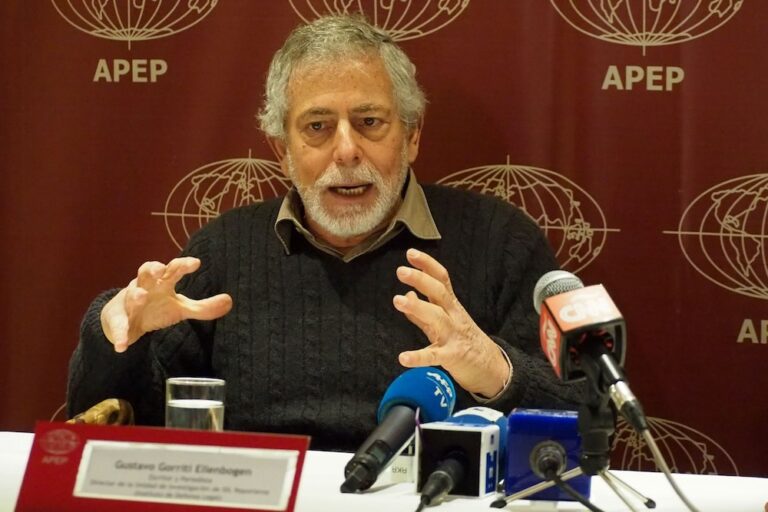Far from media attention, a Peruvian indigenous woman struggles to protect her land and water against large corporations.
I never had the chance to go school; I never had to chance to learn even a single letter. But I know how to resist, to fight. And that’s why I will never be defeated by the mining companies.
Human rights defender Máxima Acuña de Chaupe lives with her husband, Jaime Chaupe and their children on a 60-acre plot of land in Cajamarca, a remote part of northern Peru. They bought the land there in 1994 and built their own house, 4,000m above sea level and an eight hours’ walk from the nearest town. The Chaupe family are subsistence farmers, living off the crops that they grow and the milk and cheese that come from their livestock. Sometimes, when they need an item that they can’t make themselves, the family takes the long journey down into town, where they also sell their farm produce. Acuña has never learned to read; her way of life is that of a traditional “campesina” (‘country person’).
The pattern of Acuña’s day-to-day life is not much different from that of her Quechua ancestors’. However, one thing does stand out: the surveillance camera installed by a mining company on the edge of the Chaupe land, which spies on the family 24 hours a day.
The camera that watches this poor, mountain-dwelling family is an incongruous symbol of the land rights clash that is taking place between Peru’s rural population and large, multinational businesses. It is also evidence of the failure of the Peruvian authorities to protect their most vulnerable citizens from horrendous psychological and physical aggression carried out by those forces that want to take poor people’s land.
Acuña may seem an unlikely human rights defender, but, in 2016, she was awarded the prestigious Goldman Prize for her fight for the right to live peacefully on her own land. Her family lives under virtual siege conditions and she has become a source of inspiration to other rural Peruvians resisting the often rapacious tactics of mining corporations and a complicit government. This resistance has frequently been bloody: in 2012, five protesters were killed in clashes with police in Cajamarca.
Gold and copper mining is big business in Peru. Keen to develop the country’s rich mineral resources, the government has decreased environmental protection regulations, often disregarding the impact on local population. Rural Peruvians like the Chaupe family are almost never consulted at the development stages of these projects and they enjoy virtually none of the wealth generated; in many rural communities, waste from the mines is dumped in waterways, contaminating the local population’s drinking water and irrigation needs. Almost half of Cajamarca has already been handed over to mining operations and it is home to the huge Yanacocha Mine, run by the North American company Newmont and the Peruvian mining business Buenaventura. In 2010, Newmont decided it wanted to develop a new mine, which would mean taking possession of Acuña’s land.
Acuña’s refusal to sell was not taken well. In 2011, she was confronted by police officers (who were contracted out as security to the mining company); they demanded that she leave her land. She refused and was dealt with extremely violently: “I was grabbed [by] six police men,” she said in 2015; “three on each arm grabbed me from behind and they beat me with their batons, threw me to the ground, then beat my son.” Acuña says that they also beat her daughter.
And that was only the beginning. The following year, the mining company took Acuña to court, where it accused her of illegally occupying land that it claimed to have bought. A provincial judge ruled in favour of the company, despite Acuña swearing that she had never agreed to any sale. She was handed a three-year suspended sentence and ordered to pay US$2,000 in fines. Within days of the ruling, police officers and mining company employees attempted – and failed – to evict Acuña, killing several of her animals in the process. She began to receive death threats. The sentence was ruled null and void in 2013.
But the ongoing harassment did not stop. In early 2014, Acuña began building a new house on her land, and in February, approximately 200 armed men – police officers and security contractors – vindictively tore down the new building. In August of that year, Acuña was brought to court again and handed another suspended sentence and an eviction order; she stayed put, successfully appealed the court’s decision, and suffered another armed incursion onto her property. In November, the Chaupe family home was broken into and vandalised.
Acuña was granted precautionary protection measures by the Inter-American Commission on Human Rights (IACHR) in May 2014, but she had to wait two years for the Peruvian authorities to feebly take action. In April 2016 the government announced that it would send police officers to check up on Acuña twice a month. “How will they protect me?” asked Acuña: “The police were the first ones to beat me and my children up.”
In September 2016, Acuña and her husband were once again badly beaten by the mining company’s security contractors. She continues to fight through the courts to establish her property rights to the land on which she lives.



